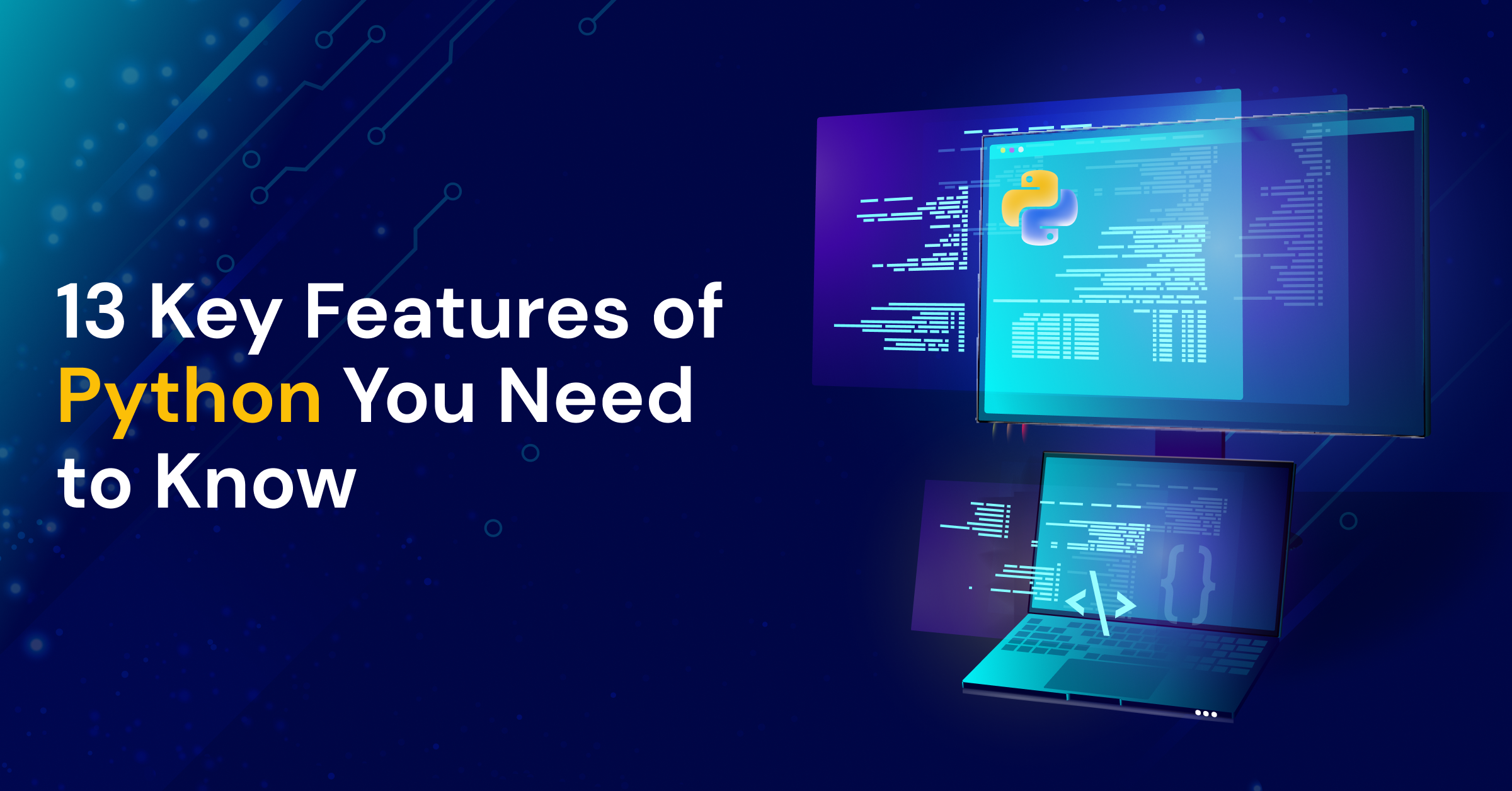
13 Key Features of Python You Need to Know in 2024
Sep 06, 2024 4 Min Read 19733 Views
(Last Updated)
Despite the fact that the market is flooded with programming languages, Python continues to be the most popular. Have you ever wondered why it continues to be so?
If you’re new to programming, you’ve probably heard about the recent buzz surrounding Python’s capabilities and are probably wondering what makes this programming language so unique.
People were able to grasp and execute codes more rapidly and with less effort as the coding process grew simpler. As a result, novices quickly embraced it.
Top 13 Features Of Python You Need To Know
In this article, we’ll go through the main Python features you’ll need to know in 2024! So, what are you waiting for? Continue reading!
Table of contents
- Easy to Code
- Open Source & Free Software
- Support for GUI
- Object-Oriented Methodology
- High-Level Language
- Highly Portable Language
- Integrated by nature
- Extremely Dynamic
- Extensive Array of Libraries
- Supportive of Other Languages
- Community Support
- Multipurpose
- Machine Learning
- Conclusion
- FAQs
- Is it necessary for me to learn Python in 2024?
- What are the most important aspects of Python's future?
- What is Python best used for?
- What are some of the benefits of using Python?
- What distinguishes Python from other programming languages?
1. Easy to Code
Python is a very developer-friendly language, which means that it can be learned in a matter of hours or days by anyone. Python is one of the easiest object-oriented programming languages to learn when compared to Java, C, C++, and C#. In Python, a task that needs complicated coding in other languages is reduced to a single line of code. This is Python’s primary advantage.
Before diving into the next section, ensure you’re solid on Python essentials from basics to advanced-level. If you are looking for a detailed Python career program, you can join GUVI’s Python Career Program with placement assistance. You will be able to master the Multiple Exceptions, classes, OOPS concepts, dictionary, and many more, and build real-life projects.
Also, if you would like to explore Python through a Self-paced course, try GUVI’s Python Self-Paced course.
2. Open Source & Free Software
Python is an open-source programming language; hence anybody can develop and improve the language. Thousands of Python programmers convene in this online forum to debate ways to enhance the language. It is possible to acquire the solution for your commercial applications for free by using these open sources. Additionally, the ability to personalize improves the basic codes while reducing development time. Python can be downloaded freely and it can be used on any operating system, like Mac OS X, Windows, and Linux.
3. Support for GUI
Support for GUI, or Graphical User Interface, is one of the most important features of any programming language since it allows code to be more visually appealing. Python is one of the most popular programming languages because it provides a wide range of GUI or graphical user interfaces that can be easily integrated into the interpreter.
4. Object-Oriented Methodology
One of Python’s most important features is its object-oriented methodology. This implies that Python understands the concept of class and object encapsulation, which allows applications to become more efficient over time.
5. High-Level Language
Python is a high-level programming language, which means that when you write code in it, you don’t have to worry about its architecture, memory management, or structure of code. This implies that while writing Python programs, we do not need to remember the system architecture or manage memory. Some Python code can be written in C or C++, and the code can even be compiled in C or C++. This makes it more programmer-friendly.
6. Highly Portable Language
Python’s primary benefit is that it is a highly portable programming language that can run on any operating system. For example, suppose you’re writing software in Windows but wish to run it on a Mac or Linux computer. Using python, there is no necessity to change the code. You can perform the same thing on a Mac or a Linux computer.
7. Integrated by nature
Python is, by definition, an integrated language. This means that each line of Python code is executed separately by the Python interpreter. Unlike other object-oriented programming languages, we don’t have to build Python code, which makes debugging much easier and faster. Another advantage is that when Python code is run, it is immediately translated into byte-code. This in turn makes execution very easy and runtime is saved in the long run.
8. Extremely Dynamic
Python, as previously stated in the article, is one of the most dynamic programming languages available today. This means that the type of a variable is determined during runtime rather than during setup. Because of this feature, we don’t have to define the type of the variable during coding, which saves time and enhances efficiency.
9. Extensive Array of Libraries
Python includes a large number of libraries that may be imported at any moment and used in a specific program right away. You won’t have to write all of the code yourself because you’ll be able to import it from existing libraries, thanks to the inclusion of a wide variety of standard libraries. Python includes unit testing, regular expressions (regex), website browsers, and many other components.
10. Supportive of Other Languages
Python is one of the most versatile programming languages in the business since it is built-in C and permits the execution of code written in other programming languages such as Java, C, and C#. This embeddable feature of Python is very helpful to the developers.
11. Community Support
Python is a widely used open-source programming language around the world. Python was created in the 1990s, so it has had plenty of time to evolve and mature as a programming language. As a result, it can assist developers of all skill levels, from novice to expert. Tutorials, manuals, e-books, and articles are all readily available as study tools. There is a solution for any python problem.
12. Multipurpose
Python is a versatile programming language that can be used for multiple purposes. Back-end web development, mobile app development, software development, and desktop app development, and are just a few examples. It’s also used to process large amounts of data and perform mathematical calculations. System scripts can also be written in Python.
13. Machine Learning
In the world of technology, machine learning has a bright future. Python is, without a doubt, the best language for machine learning. Because it’s simple to understand, data validation is quick and error-free. Developers can do difficult operations without coding since they have access to a well-developed library ecosystem.
Kickstart your Programming journey by enrolling in GUVI’s Python Career Program where you will master technologies like multiple exceptions, classes, OOPS concepts, dictionaries, and many more, and build real-life projects.
Alternatively, if you would like to explore Python through a Self-Paced course, try GUVI’s Python Self Paced course.
Conclusion
We have compiled a list of the top 13 features that Python has to offer today in this article. As mentioned in the article, Python is very easy to learn and to understand, it helps in the automation of tasks, and can be used in a variety of ways. All of these features have contributed to python’s uniqueness and popularity.
To conclude we can surely say that, Python can help you get the most out of your resources by allowing you to create faster and more easily. The credibility of python cannot be questioned because it has been employed by tech giants. Despite stiff competition, the python not only survives but also triumphs in the race.
No matter how much technology changes in the future, Python is here to stay. Python is the answer if you want to stay ahead of the competition in today’s challenging programming world! Do tell us which feature of Python appealed to you the most in the comments section below!
FAQs
1. Is it necessary for me to learn Python in 2024?
Python is a well-known, simple-to-learn programming language with a large and active user base. Python is a great place to start if you want to use coding to advance your career in the coding world.
2. What are the most important aspects of Python’s future?
When we think of future technologies, we think of terms like Data Science, AI, IoT, Machine Learning, and Automation, which are all important aspects that drive up demand for the Python language among newbies and experts alike.
3. What is Python best used for?
Python is widely used for web and software development, automating tasks, data analysis, and data visualization.
Due to its relative ease of learning, Python has also been used by many non-coders, such as financial analysts and traders, for a variety of typical activities, such as arranging finances for instance.
4. What are some of the benefits of using Python?
Easy to Read, Learn, and Write, Increased Productivity, Free and Open-Source, and Portability are just a few of the benefits of adopting Python.
5. What distinguishes Python from other programming languages?
Python is one of the most approachable programming languages today, thanks to its simple syntax and lack of technicality, which allows natural language to take center stage.
Python codes are way easier to understand and use than other programming languages. They can also be written and executed much faster. This contributes to the distinguishability of Python.























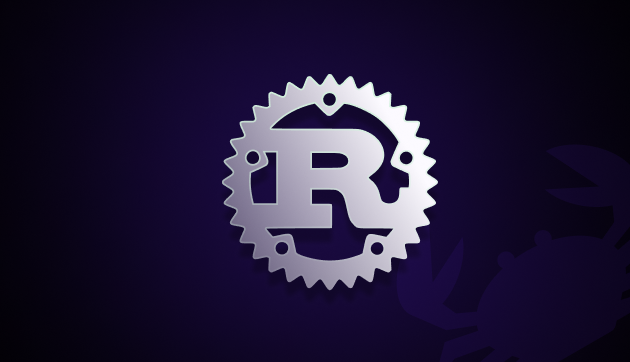

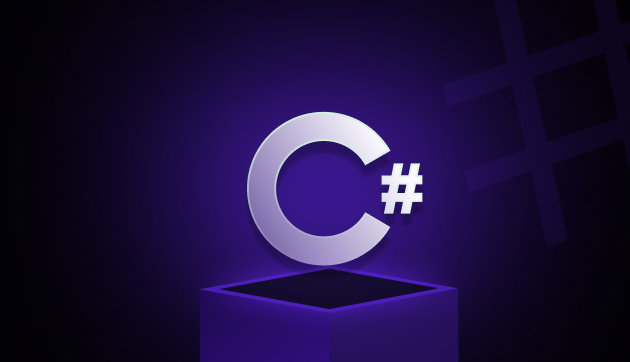
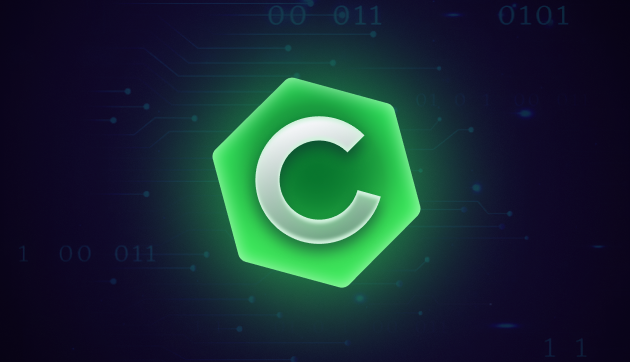




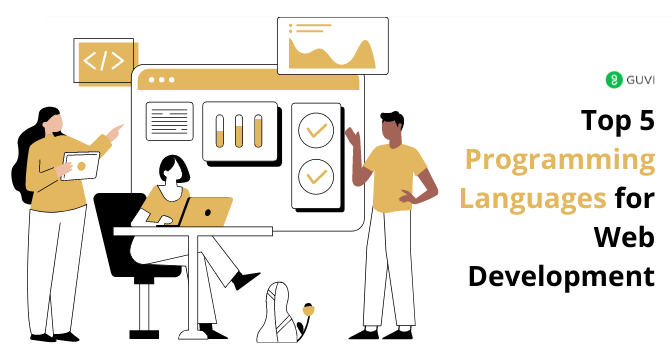
Did you enjoy this article?